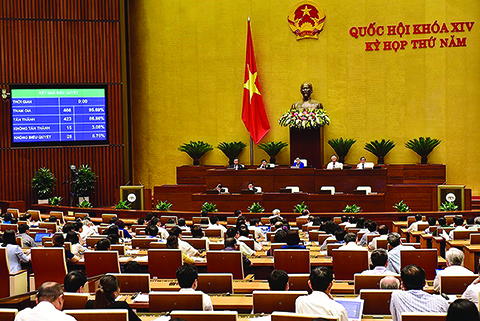HANOI: Vietnamese legislators approved a cybersecurity law yesterday that tightens control of the internet and global tech companies operating in the Communist-led country, raising fears of economic harm and a further crackdown on dissent. The cyber law, which takes effect on Jan. 1, 2019, requires Facebook, Google and other global technology firms to store locally “important” personal data on users in Vietnam and open offices there.
The vote in the National Assembly came a day after lawmakers delayed a decision on another controversial bill that had sparked violent protests in parts of the country on the weekend. Thousands of demonstrators in cities and provinces had denounced a plan to create new economic zones for foreign investment that has fuelled anti-Chinese sentiment. Some protesters had also derided the cybersecurity bill, which experts and activists say could cause economic harm and stifle online dissent.
Yesterday’s vote was held as police manned barricades outside the legislature in the capital Hanoi. The cyber law was approved by 91 percent of attending legislators. Human rights group Amnesty International said the law was a “devastating blow” for freedom of expression, allowing the state to force tech companies to hand over potentially vast amounts of data, including personal information, and censor users’ posts.
‘No safe place left’
“With the sweeping powers it grants the government to monitor online activity, this vote means there is now no safe place left in Vietnam for people to speak freely,” Clare Algar, Amnesty’s director of global operations, said in a statement. Under the law, social media companies in Vietnam are required to remove offending content from their platforms within one day of receiving a request from the authorities.
The Asia Internet Coalition (AIC), an industry group that was leading efforts to soften the proposed legislation, said the law would hinder Vietnam’s ambitions for GDP and job growth in developing a digital economy. “These provisions will result in severe limitations on Vietnam’s digital economy, dampening the foreign investment climate and hurting opportunities for local businesses and SMEs to flourish inside and beyond Vietnam,” said AIC Managing Director Jeff Paine.
Vo Trong Viet, head of the defence and security committee that drafted the law, said the requirement to store data inside Vietnam was feasible, crucial to fighting cyber crime and in line with international rules. “Placing a data centre in Vietnam increases costs for businesses but is a necessary requirement to meet the cybersecurity need of the country,” he told legislators.
The United States and Canada had urged Vietnam to delay the vote and review the law to ensure it met global standards and addressed concerns that it may hurt digital innovation in Vietnam, where its 94 million people are a target for local small businesses as well as global consumer brands. About 55 million Vietnamese are regular social media users, according to a 2018 global digital report by the media consulting firm We Are Social, and Hootsuite, a social media management firm.
Vietnam ranked seventh among active Facebook-using countries, the report said, while its economic hub, Ho Chi Minh City, was number 10 among cities with active Facebook users. Canada said some of the localisation requirements might increase costs, uncertainty and risks for Canadian businesses and inhibit their global operations. The Vietnam Digital Communication Association said the requirements could reduce Vietnam’s gross domestic product by 1.7 percent and wipe off 3.1 percent of foreign investment. Trade and foreign investment are crucial to Vietnam’s economy. - AFP


